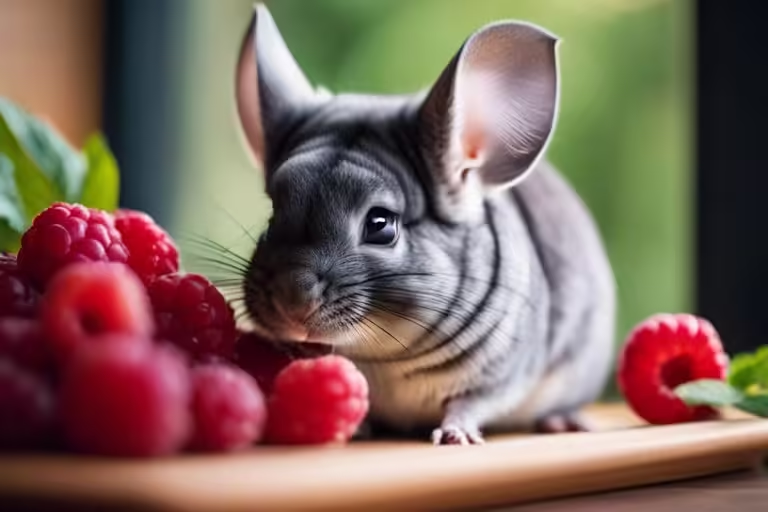No, Here’s Why They Should Avoid Them
Chinchillas are delicate creatures with highly sensitive digestive systems, requiring a specific diet to stay healthy. While raspberries may seem like a harmless treat, they contain high amounts of sugar and water, which can disrupt a chinchilla’s digestion and lead to serious health issues. In this guide, we’ll discuss why raspberries are unsuitable for chinchillas, which foods to avoid, and better alternatives for a healthy diet.
Key Takeaways
- Raspberries are not safe for chinchillas due to their high sugar and water content, which can cause digestive upset.
- Avoid unsafe foods like cabbage, corn, and nuts to prevent health issues.
- Stick to safe foods like hay, kale, and carrots, and offer occasional treats like dried berries sourced from reputable suppliers.
Why Are Raspberries Unsafe for Chinchillas?
Raspberries are high in sugar and water, both of which can harm a chinchilla’s digestive system.
Key Risks of Raspberries
- High Sugar Content
- Raspberries contain 4.4 grams of sugar per 50 grams, which is excessive for chinchillas. Excess sugar can lead to obesity, tooth decay, and diabetes.
- High Water Content
- With 41 grams of water per 50 grams, raspberries can cause diarrhea and bloating in chinchillas. Their bodies are not adapted to handle water-dense foods.
- Digestive Disruption
- Chinchillas thrive on a fiber-rich diet. Introducing sugary, watery fruits like raspberries can upset their gut microbiome and lead to gastrointestinal distress.

Unsafe Foods for Chinchillas
In addition to raspberries, there are other foods that should be avoided:
| Unsafe Foods | Reason |
|---|---|
| Raspberries, strawberries, blueberries | High sugar and water content. |
| Cabbage, lettuce, asparagus | Cause bloating and digestive upset. |
| Corn | Difficult to digest and high in starch. |
| Nuts and sunflower seeds | High fat content leads to obesity. |
| Potatoes and sweet potatoes | High in starch, harmful to digestion. |
Safe Foods for Chinchillas
Instead of unsafe fruits and vegetables, stick to these chinchilla-safe options:
| Safe Foods | Nutritional Benefits |
|---|---|
| Clean hay (e.g., timothy) | High in fiber, essential for digestion. |
| Kale, carrots, squash | Low-sugar vegetables, rich in vitamins. |
| Alfalfa (in moderation) | Great for young chinchillas, high in calcium. |
| Dried berries (e.g., rosehips, goji berries) | Antioxidant-rich treats in small amounts. |
How to Feed Treats Safely
If you want to offer your chinchilla a special treat, follow these tips to ensure their safety:
Portion Control
- Offer no more than one dried berry or a small piece of vegetable (e.g., 1-inch carrot slice) per week.
Sourcing Treats
- Only purchase dried berries like rosehips and goji berries from reputable suppliers to avoid harmful additives or contaminants.
Monitor Reactions
- Watch for signs of digestive upset, such as diarrhea or reduced appetite, after introducing new treats. If symptoms occur, discontinue the treat and consult a veterinarian.
Dietary Basics for Chinchillas
To maintain optimal health, focus on the following:
Staples
- Hay: Provide unlimited access to timothy or orchard grass hay. It is the cornerstone of a chinchilla’s diet, supporting digestion and dental health.
- Pellets: Feed chinchilla-specific pellets with high fiber (20–25%) and low fat (<5%).
Occasional Treats
- Safe Options: Dried rosehips, goji berries, or hawthorn berries.
- Vegetables: Kale, celery, and carrots in tiny portions.
Foods to Avoid
Avoid high-sugar, high-starch, and fatty foods. Stick to low-calorie, fiber-rich items to mimic their natural diet in the wild.
FAQs
Q: Can chinchillas eat raspberries?
A: No, chinchillas should not eat raspberries due to their high sugar and water content, which can cause digestive upset and obesity.
Q: What fruits can chinchillas eat?
A: Chinchillas can eat small amounts of dried berries like rosehips or goji berries. Fresh fruits like apples and blueberries are also safe in moderation but should be offered sparingly.
Q: What are the best treats for chinchillas?
A: The best treats are chinchilla-safe dried berries and low-sugar vegetables like kale and carrots. Always ensure treats are given in moderation.
Conclusion
Chinchillas should not eat raspberries due to their high sugar and water content, which can upset their sensitive digestive systems. Instead, prioritize a diet of clean hay, chinchilla pellets, and occasional safe treats like dried rosehips or kale. Avoid high-sugar and high-starch foods to keep your chinchilla healthy and happy.
By following these dietary guidelines and consulting a veterinarian for personalized advice, you can ensure your furry friend enjoys a long and vibrant life.
